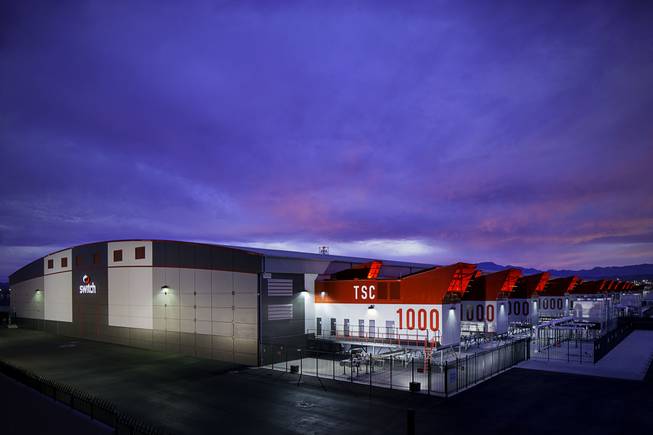
Courtesy of Switch
Switch SUPERNAP.
Wednesday, May 20, 2015 | 2 a.m.
Power industry experts are challenging a Public Utilities Commission legal memo issued last week that critiques a Las Vegas tech company for wanting to sever its ties with NV Energy.
Switch, a tech company that runs one of the nation’s leading data centers and counts among its customers an array of Fortune 1000 clients, applied to the PUC in November to generate and purchase power without the utility.
The PUC’s three independent regulators will make a decision on the case in June. The memo, written by the commission’s regulatory operations legal staff, panned Switch’s application as a “tortured” attempt to leave NV Energy, suggesting the tech company was twisting state statute to leave the utility.
But experts on the law, dubbed NRS 704b, and the law’s own architects agree Switch is entitled to make use of it.
The statute, passed in 2001, allows companies to cut ties with the utility if they consume more than 1 megawatt of power per year, pay an exit fee and receive PUC approval. (A Super Walmart consumes about three-quarters of a megawatt per year. Switch uses 34.)
The law was an effort to provide large-scale power consumers with more options for buying and creating power. Lawmakers passed it during the California energy crisis spurred by Enron, the defunct energy company that manipulated power markets in Western states to improperly control the price and availability of electricity.
The memo from the PUC regulatory staff used the current market conditions to argue against Switch’s proposal. Since 2001, the energy crisis ended, fracking created a fossil-fuel energy boom, lawmakers passed mandates to build more power plants and the utility secured long-term power purchase agreements that equate to more than 4,700 megawatts of generation capacity (nearly two-thirds of the utility’s peak capacity).
The law, though, makes no mention of market conditions as a factor for application to leave the utility, Randolph Townsend, a former Republican state senator who helped write the law, said.
“Market conditions have changed,” he said. “That does not change the law. If you want to change the law go ahead and change the law.”
The staff memo interprets the historical context of the law and said “the 2001 Legislature did not, and could not, have foreseen the immense change the [utilities] and the energy markets would undergo in the ensuing 14 years.”
“That’s a tortured interpretation,” said Jon Wellinghoff, a former Federal Energy Regulatory Committee chairman who also served as the former chief counsel for the PUC and was Nevada's first Advocate for Customers of Public Utilities. He also helped write the law. The statute is “cut and dry,” he said.
“The law is just as available now as it was back when we wrote it,” he said.
Switch’s legal counsel responded to the PUC memo and reiterated what the statute’s authors told the Sun, saying “if the Legislature intended to limit NRS 704b’s applicability to 2001-style market conditions, it would have written the statute to that effect.”
NV Energy and the PUC declined to comment on an ongoing case.
Along with the legal interpretation of the law, the effect on NV Energy’s ratepayers is also a concern addressed by Switch, NV Energy and the PUC in the case.
The law mandates an exit fee paid to the utility by the company that ends a power purchasing agreement with the utility. Switch is one of the utility's largest privately owned power consumers in the state. Its exit was not considered when the PUC devised the utility’s customer rates last year.
The utility forecasted the revenue from Switch’s future power bills into its long-term outlook. The PUC recommended Switch pay $27 million to protect ratepayers and compensate for the estimated loss of revenues to NV Energy. Switch requested it pay $18 million, and NV Energy wanted more than $30 million. The PUC’s three regulators will decide on the exit fee when they issue a final decision on the Switch case in June.
The Switch case will be a litmus test for similar attempts beginning to move through the PUC’s public vetting process. Wynn Resorts and Las Vegas Sands started public applications with the PUC this month to purchase and generate their own power. MGM Resorts International and Caesars Entertainment signaled they will also apply.
The effort to decouple from the utility sparked a battle in the state about consumer choice. Consumer advocates contend it poses a question about how much control the utility should have in the power purchase markets and how much control the utility should have over its customers.
The movement coalesced last week with a group made of Switch, Wynn Resorts, Las Vegas Sands and two solar companies formed the Nevada Coalition to Protect Ratepayers.
Its effort is an attempt to raise awareness on energy consumption ranging from homeowners who want to install rooftop solar panels to large-scale casino-resort operations.
Switch wants to stop buying power from NV Energy in an effort to have lower power bills and consume 100 percent renewable energy in the coming years. The company has said the ability to lower its bills by providing its own energy is a key tool to staying competitive.
If the Las Vegas Strip’s prominent casinos along with Switch all leave the grid, that would equate to at least 7 percent of the utility’s power demand.

Join the Discussion:
Check this out for a full explanation of our conversion to the LiveFyre commenting system and instructions on how to sign up for an account.
Full comments policy